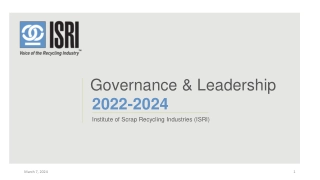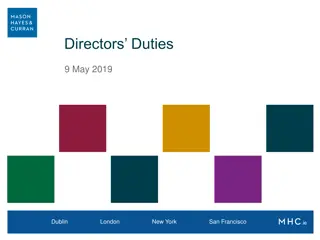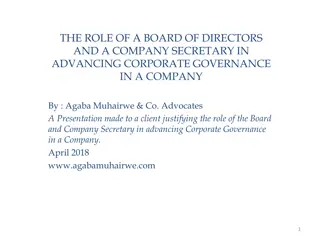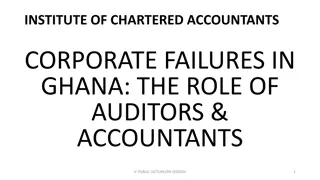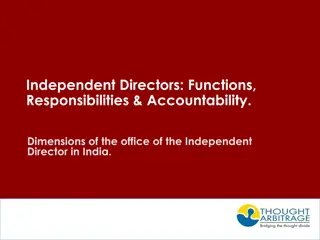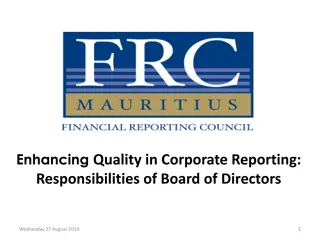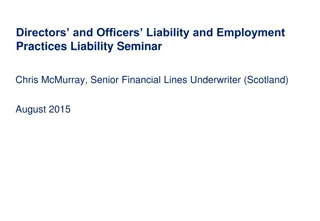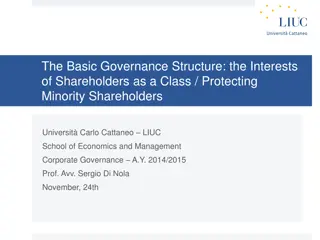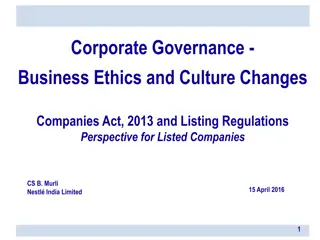The Role of Independent Directors in Corporate Governance: A Critical Evaluation
The role of independent directors in corporate governance is critically evaluated in this content, addressing the effectiveness and limitations of independent boards in addressing governance issues. The history and rise of independent directors, empirical research on their effects, and the importance of diverse expertise in director appointments post the 2007-08 financial crisis are discussed.
Download Presentation

Please find below an Image/Link to download the presentation.
The content on the website is provided AS IS for your information and personal use only. It may not be sold, licensed, or shared on other websites without obtaining consent from the author.If you encounter any issues during the download, it is possible that the publisher has removed the file from their server.
You are allowed to download the files provided on this website for personal or commercial use, subject to the condition that they are used lawfully. All files are the property of their respective owners.
The content on the website is provided AS IS for your information and personal use only. It may not be sold, licensed, or shared on other websites without obtaining consent from the author.
E N D
Presentation Transcript
THE ROLE OF INDEPENDENT DIRECTORS: A CRITICAL EVALUATION OF CURRENT APPROACHES Hans De Wulf & Jan Cerfontaine
THE KEY GOVERNANCE FIXER ? 3
ALWAYS THE SOLUTION, OR NEVER AN EFFECTIVE SOLUTION? Independent boards are the most popular pill that doctors prescribe to companies as the solution to whatever governance problems they might suffer (M. Guti rrez Urtiaga & M Saez, Deconstructing Independent Directors ) When an 800-pound gorilla wants the rest of the bananas, little chimpanzees, like independent directors and minority stockholders, cannot be expected to stand in the way, even if the gorilla putatively gives them veto power. (Leo Strine, Chief Justice, Delaware Supreme Court) 4
THE INDEPENDENT DIRECTOR: HISTORY AND DATA 5
THE RISE OF INDEPENDENT DIRECTORS US: from 1980s onwards Delaware courts rule that in conflicted and semi-conflicted situations- like defences against hostile takeovers, or change of control transactions- boards can create a presumption of meeting fiduciary duties if they outsource the decision to a committee of independent directors Europe: 1992 Cadbury Code promotes them as counterweight against dominant executives that had been present in scandals like Maxwell, Polly Peck that led to Cadbury Later reinforced by EU rules on board committees (eg audit and remuneration) made mandatory after scandals 6
EMPIRICAL RESEARCH ON EFFECTS Dominated by research on effects in US Effect on firm value and performance: No effect, or slightly negative effect Would indeed be odd if they did have such effects Empirical research meets its limits: can say nothing reliably about long- term causal effects Effect on governance practices: Much research that shows positive correleation with lower CEO pay, higher CEO turnover, less accounting fraud, 7
AFTER THE 2007-08 FINANCIAL CRISIS Need stressed to have directors with certain expertise/technical skill sets, like expertise in banking or accounting skills => too many independent directors should not block sufficient number of experts being appointed Eg. German Landesbanken, or anecdote of financialy illiterate theatre director as director of Lehman Brothers =>if firms do indeed concentrate on expertise, the pond in which they fish becomes smaller=> increased risk of cosy relationship with executives/ old boys network 8
THE INDEPENDENT DIRECTOR IN THE BELGIAN CONTEXT 9
RULES FOR ALL LISTED COMPANIES AND PUBLIC INTEREST ORGANISATIONS Listed companies need at least 3 INEDs: Related party transactions (three directors; art. 7:97) Audit committee: at least one; remuneration committee: a majority (= at least two); Intra-group public bids: independent directors need to select independent expert for fairness opinion Note: no recommendation in CGCode to have independent chair, and chair usually will not be independent of major shareholders, merely non-executive 10
DEFINITION: ART. 7:87 CCA Under pressure from listed companies, CCA does not list criteria anymore: transferred to Corp Gov Code 2020 7:87 CCA: no relationship that threatens independence Rebuttable presumption that person who meets criteria from 2020 CGCode, is independent Government must check whether Code criteria are acceptable If board nominates as independent person who does not meet criteria, it must explain to general meeting why this person is independent 11
REACTION IN FINANCIAL SECTOR LEGISLATION Omnibuswet 27 June 2021 on financial supervision Calls CCA rules (art. 7:87, previous slide) a step backwards In particular not desirable to have independence criteria set by private organisation Regrettable that criteria are non-binding (comply or explain) => in view of the importance of the financial sector for the economy, binding rules on position of directors must be established in a lex specialis Remarkable that in one and the same legislator, the left hand does not seem to trust what the right hand does 12
BELGIAN GOVERNANCE COMMISSION MEMO 2022 Not certain what prompted this; probably worries by FSMA of insufficient role of INEDS in some recent cases , like the ongoing Nyrstar saga FSMA has also announced that it will suggest changes to legislation concerning independent director nomination 13
BELGIAN GOVERNANCE COMMISSION MEMO 2022 Memo first warns against too operational a role of non-executive directors Background seams idea that if there is 800 pound gorilla (controlling shareholder), he and his executives should not meddle in operations through the board= saying board should have non-operational role, and that INEDS should check this role is maintained 14
MEMO MAIN RECOMMENDATIONS ON INEDS 1. INEDS make sure sufficient, clear and correct information is provided to market and shareholders 2. INEDS should make sure they receive detailed information; if need be they hire their own experts 3. INEDS safeguard a debating climate and if they have reservations, communicate them 4. If necessary, INED contacts regulator or external auditor 15
SOME COMMENTS ON THE MEMO 1. Strange that INEDS should intervene/do external communication; INED can insist within board that shareholders receive sufficent info; but first needs to get info itself press release by INEDS requires totally different board model than current one 2. As it is, it s difficult and sensitive enough for INEDS to get information from management other than through board; expecting them to gather this independently, or even hire external experts, at the very least requires written board rules ( intern reglement ) and probably underpinning in companies act 3. It is the board chair which should enable a debating climate; if chair can t do it, no good to expect INEDS to do this; can in any case only work if they are a sizeable group within board 4. again means move towards board as bureaucratic controller model; and hard law rules on confidentiality need to be clarified before one can allow INED to contact external regulator, or even external auditor 16
3 TYPES OF AGENCY PROBLEMS Governance issues framed as agency problems Type 1: management v shareholder Type 2: controlling shareholder v. minority Type 3: creditor v company/its controlling shareholder Specifically for bank governance, as creditors are the most crucial stakeholder of the banks, the major Type 3 agency problem of banks becomes a debt governance issue Later extended to stakeholder governance for all (financial and non-financial) firms. INEDs were invented in system where Type 1 agency problem predominates ( strong managers, weak owners ) With few controlling shareholders but also no shareholder activism And shareholder primacy was the dominant paradigm INEDs just one of the instruments to control this Type 1 agency problem 18
TYPE 2 AGENCY PROBLEMS Majority vs minority shareholders In a firm with a concentrated shareholding structure, and with a powerful and dominant shareholder in place, managers are subject to enhanced monitoring and supervision, which minimizes Type 1 agency problems The controlling shareholder is likely to pursue its own interest in sacrifice of the corporation s interest if the benefits garnered therefrom are greater than the losses. The misaligned interest between the controlling shareholder and minority shareholders leads to the Type 2 agency problem INEDs are considered as an instrument to control this Type 2 agency problem. 19
TYPE 3 AGENCY PROBLEMS Creditors/stakeholders vs shareholders Banks are more leveraged than ordinary firms, and thus bank creditors incur higher risks. Bank creditors are less sophisticated in and less capable of negotiating the terms of credits and monitoring the banks (public depositors). To address this Type 3 agency problem, from a corporate perspective it is proposed that banks creditors deserve some enhanced protection. For the monitoring of the Type 3 agency problem governance regulation AGAIN relies on the independent director. This is not only the case for bank governance, but more in general independent directors should keep an eye at the interests of other stakeholders of the firm, and even of the society at large . 20
INDEPENDENT DIRECTORS IN A TYPE 2- AGENCY SETTING Bebchuk & Hamdani, Independent directors and controlling shareholders The existing arrangements for electing directors undermine the effectiveness of independent director oversight. These arrangements provide controlling shareholders with decisive power to appoint independent directors and decide whether to retain them, independent directors have significant incentives to side with the controller and insufficient countervailing incentives to protect public investors in conflicted decisions. Thus, independent directors currently relied upon to contain controllers conflicts cannot be expected to be effective guardians of public investors interests. 22
INDEPENDENT DIRECTORS IN A TYPE 2- AGENCY SETTING CONT D The rules governing the appointment of independent directors could be refined to make their oversight more effective. To improve the effectiveness of independent directors in cases of controllers conflicts, some directors should be elected in ways that would make them at least somewhat accountable to public investors. These directors, which are referred to as enhanced-independence directors, should play a key role in approving self-dealing transactions. 23
INDEPENDENT DIRECTORS IN A TYPE 3- AGENCY SETTING Brian Cheffins & Bobby Reddy, Thirty Years and Done Time to Abolish the UK Corporate Governance Code . Stakeholder orientation in the Code since 2010, but mismatch between the Code and Stakeholder Issues. Since 2018 multiple references to wider society, company purpose, values and culture, workforce policies and practices . But the Code cannot supplant directors duties as codified in the law. 24
INDEPENDENT DIRECTORS IN A TYPE 3- AGENCY SETTING CONT D Shareholders are exclusively vested with key powers that can be deployed to encourage Code compliance, such as removal of directors, voting on directors standing for annual re-election, and votes on executive pay. The extent to which Code-dictated stakeholder governance norms will be observed, will necessarily be dependent upon the extent to which shareholders are inclined to enforce them. The extent to which shareholders/investors can be counted-on to support those initiatives, remains unclear when profits have to be sacrified. 25
CONCLUDING REMARKS 26
INEDS: A GOVERNANCE TRANSPLANT Independent director model developed in and for governance systems with no controlling shareholders and shareholder primacy model Has been transplanted to system (Belgium, Continental Europe) where controlling shareholders predominate where board is supposed to become more stakeholder-oriented (ESG) or already is (financial sector: creditors) INEDs supposed to tackle also type 2 and 3 agency problems. 27
HUGE EXPECTATIONS GAP Expectations far too high in view of Appointment, dismissal and pay set by controlling shareholder Universal huge information gap between executives and NEDs Belgian board culture where independents are not given mandates to de facto take decisions <-> US committees At present, INEDS are ordinary directors in a collegial board that usually want to take consensus decsions, with no special rights for INEDS, and no right for external communication 28
EFFECTIVENESS OF INEDS Have proven track record and added value in related party transactions-type situation in US But a reinforcement of this role in a Belgian context, and with our board models and culture requires changes to the law Eg on possibility/duty to hire external experts and/or to contact supervisors/regulators Transform them into permanent commitee within board, that negotiates certain deals without executive/big shareholder involvement 29
EFFECTIVENESS OF INEDS CONTD If policy-makers want more, namely INEDs as General protectors of minority v controlling shareholder Protectors of broader stakeholder interests Replacement of failing chairpersons and external supervisors. Then at the very least some legislative changes are required: Insulating the nomination and voting process from influence of controling shareholders and executives, meaning something resembling INED cooptation Moving away from a completely collegiate board model, with strong inspection rights and expert hiring rights, and the INEDs doing most of their work in separate commitees. 30
Hans De Wulf & Jan Cerfontaine FINANCIAL LAW INSTITUTE Universiteit Gent @ugent @ugent Ghent University Ehans.dewulf@ugent.be T+32 9 264 68 29 M+32 473 83 24 49 www.ugent.be


